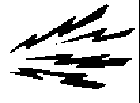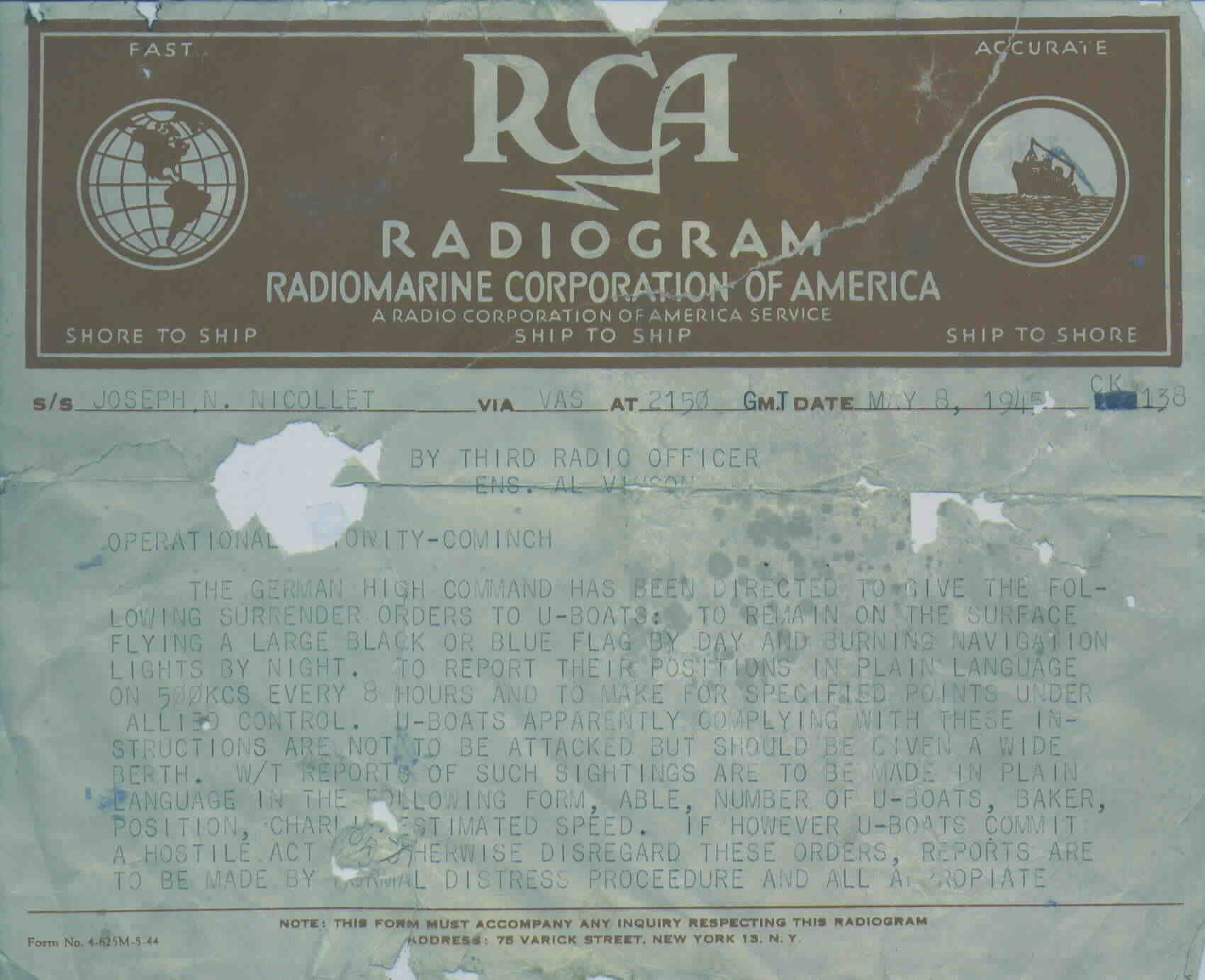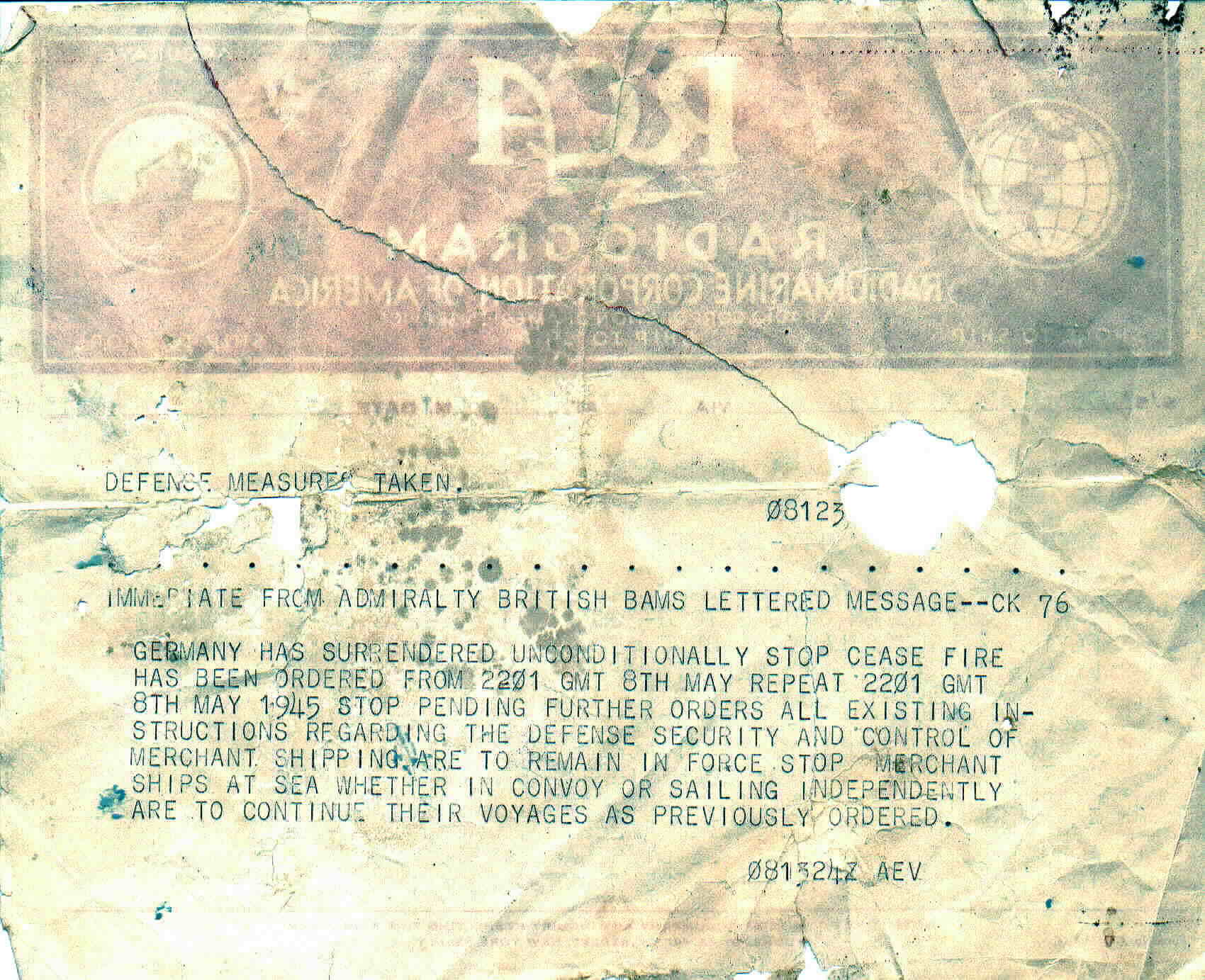Ah Yes There's Good News Tonight
By Al Vinson, former Merchant Marine and well known
radio personality in Texas
Note from Co-webmaster. Al Vinson was a young radio announcer in
Lufkin, Texas when the United States entered the war. Later he entered
the Merchant Marines as a radio operator. Although he was not a member
of the 69th Division, the Merchant Marines were instrumental in getting us
deployed. I think you will find his story interesting.
(Check out two attachments to this story.
A couple of weeks ago, I came across
an old radio message I copied at the end of
World War Two. The top attachment is page two, and the
bottom one is page one. I received
them on board a ship in the Atlantic,
while serving as a radio operator in the Merchant Marine.)
Seems like a hundred,
but it was only sixty years ago
when WWII ended. From
the Port of Houston, I boarded a Liberty Ship, the SS Joseph N. Nicolette as Third Radio Officer.
On a foggy morning, near the end of April, we made our
way down the Houston Ship Channel to Galveston. We
spent the first night far
out in the Gulf of Mexico. As radio
operator, I was privileged
to have info about ships orders. We were sailing East, toward Florida,
and I learned we were to join a convoy of forty ships near Norfolk,
Virginia.
Two weeks later, we joined
the convoy, and in my
first Atlantic storm. Even with the pouring rain, and
high winds, we had such a foggy atmosphere that we couldn't see the ships next
to us. On the
bridge, they had contact by signal lights, but we couldn't see the lights one
deck below the bridge. Faith had a supreme test that long night
off Norfolk, as we found our place in the convoy. We sailed East on
the stormy Atlantic before dawn. We
were in this storm for two more days. And then the action really began. I
began receiving un-coded radio signals for the first time. Radio silence
was in effect for
all vessels during World War II. Only in extreme
emergencies, were we allowed to transmit from our ships radio. We
received coded orders each day, but
were not allowed to reply in any manner except by signal
lights from ship to
ship. Shore stations sent hourly weather advisories and
warnings of hazards
to shipping, like mine and submarine sightings. So I was not only
surprised, but excited,to receive an un-coded message in the
early days of May,
1945. Maybe you guessed why. The message announced the
end of hostilities
in the European theater .....V-E
Day.....hooray!
Next came the rules of engagement, or
disengagement since the wars end. And that's when the war
began for me, my
first action since entering the Merchant Marine. And it was the
kind of action I
would enjoy. Nothing dangerous,
if you rule out our suspicions and
uneasiness with our task. A
small boat came alongside our vessel, and
the Convoy Commander came aboard. He didn't go to the Captains quarters,
but directly to the radio
cabin. All three radio operators were present.The Chief Radio
Officer advised that our station was now the Convoy Commander's
headquarters, and we had been chosen because our Second Radio Officer was from
Allentown, Pennsylvania, and spoke fluent German. He would serve as
interpreter for our convoy and for the
Navy defensive ships which surrounded
the convoy. I was the Third
Radio Officer, and soon would be
in contact with German submarines in our vicinity. I
sweated more suspicion....and
fear. During the next three days, we would be in
communication with four German U-Boats that had been lying in wait for our
convoy. I could now say
I was had earned the title every radio operator wore, "S
P A R K S."

The emblem of sparks we wore on the sleeves of our dress uniform were gold
embossed emblems that identified the wearer as a Radio Officer.
Very weak signals were
received from the submarine, and each contact went directly to our Second
Radio Officer to be deciphered from our hand copy. All three
operators copied the submarine signals. Where one of us missed a word or two, odds were
that another operator
would be able to copy. My ears
ached from the strain to get every
character of the message. None of
us ever copied a complete message, but
by combining the copies, we had a
good message.
Our
message to all area submarines gave orders for surrender, with instructions to
surface, flying a black or blue flag. The subs were receiving
the same instructions by high frequency radio from their commanders. In
the next three days, four U-Boats surfaced, flying their beautiful blue flags,
and were at once met by our Navy Destroyer escort ships. Three of
the subs were
escorted to Norfolk, and one
to Boston.
(The messages below are copies
of the front and back page of the
old RCA forms we used at the time.)





